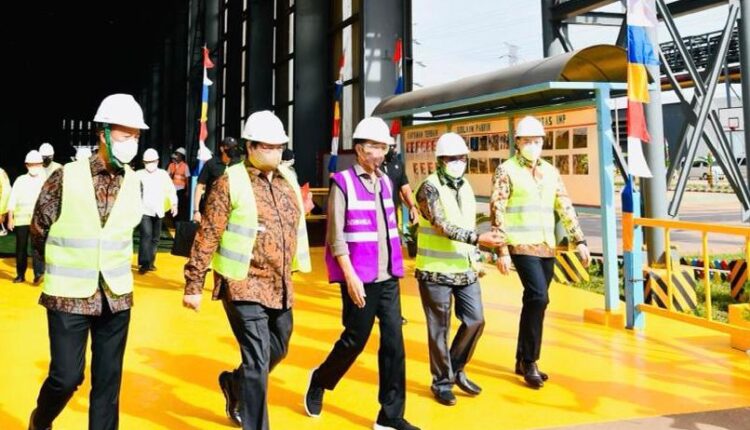The Government is Committed to Continue the Downstream Program for the Advancement of Indonesia
The government’s commitment to continuing the downstream program is still maintained, this is because the downstream program has an impact on absorbing labor and is able to increase added value for the country and increase employment opportunities.
Indonesian President Joko Widodo (Jokowi) again discussed the downstreaming of Indonesian mineral products. He firmly stated that he did not care about being sued by the World Trade Organization/WTO or being commemorated as the International Monetary Fund (IMF).
Jokowi said downstream must continue. Because according to him, downstream is something that can increase added value for the country and increase employment opportunities. For example, in Central Sulawesi Province, where nickel downstream has currently created more jobs than before.
The former mayor of Surakarta said that before downstreaming, only 1,800 workers were involved in nickel processing. After downstreaming, there are 71,500 workers who can work because of nickel downstream in Central Sulawesi.
Jokowi also said that downstreaming in North Maluku had added a workforce from previously only 500 people, now it has increased drastically to 45,600 workers. In addition, Jokowi also revealed that the added value of downstream nickel. In 2014 it was only 2.1 billion US Dollars, then now it has jumped to 33.8 billion US Dollars.
In 2014, there were only 2.1 billion US Dollars. After downstreaming, it became IDR 510 trillion, from 2.1 billion US Dollars, it jumped to 33.8 billion US Dollars. Means that the jump is a few thousand miles away.
Jokowi also hopes that his successors will continue the downstream program in all fields for the sake of the progress of the nation, which will be welcomed by entrepreneurs. This affirmation, of course, encourages downstreaming to continue and not stop when the government changes in 2024.
Previously, President Jokowi also said that after the downstream nickel export program, which initially contributed IDR 17 trillion, it increased to IDR 450 trillion. This increase occurred due to the processing of nickel into finished and semi-finished goods. This processing process allows the state to obtain other revenues from income tax, VAT tax, non-tax revenue, export duties and employee taxes. The President also added that an increase in state revenues could, of course, increase financing to improve the quality of life of the community, such as village development financing.
If this happens, it is not impossible that the downstream program will be able to increase development in Indonesia. Especially development from the village and from the outskirts.
Meanwhile, the Coordinating Minister for Maritime Affairs and Investment Luhut Binsar Pandjaitan stated that he had met the United States Trade Representative (USTR). During the meeting, Luhut showcased the advantages of the nickel export ban. According to him, the ban on nickel exports was carried out in the context of downstreaming nickel. Nickel is ‘forced’ to remain in the country but its value is added. This boosts the industrial sector in Indonesia as well.
Luhut further emphasized to USTR that so far only raw niel has been banned from export. However, its derivatives which make a bigger profit may still be exported. After this explanation, Luhut said that the US only understood why Indonesia had taken the extreme step of banning nickel exports.
Luhut also pointed out to USTR Indonesia’s achievements in having a positive trade balance for 38 months in a row. According to him, everything happened because of digitalization and also downstream industry.
On a different occasion, Special Staff to the Minister of Investment/Head of BKPM Tina Talisa felt optimistic that President Joko Widodo’s successor would continue the downstream program that was already underway. The reason is, downstream is not a 1 or 2 year program, but for the future of Indonesia. Tina also said that there was already a road map related to downstreaming. So that whoever the leader can continue the existing program.
So that the industrial downstream program in the country is expected to continue. Despite being declared defeated against the European Union (EU) over a lawsuit at the World Trade Organization (WTO ). The government also doesn’t need to be afraid of facing lawsuits at the WTO, moreover downstream from minerals is a mandate of the Minerba Law number 3 of 2020 which absolutely must be fought for, both by the government and the legislature.
Claiming against each other is a natural thing. As before, Indonesia also had a lawsuit filed with the WTO against the European Union regarding palm oil discrimination some time ago. Therefore, he hopes that the government will continue the downstream program in the country’s mining sector, even in the midst of European Union threats to the World Trade Organization (WTO).
So giving up is not an option, especially since there are many mining downstream strategies, such as the construction of many smelters coupled with the agility of Indonesia’s international trade diplomacy on the other side. Sustainability of downstream must continue to be pursued for the sake of strengthening the national economy which has an impact on other sectors, including the employment sector.
